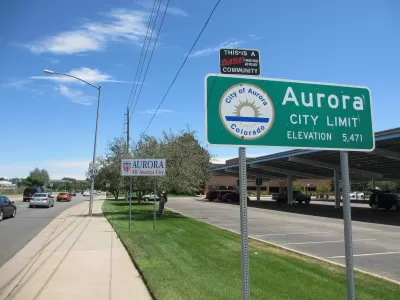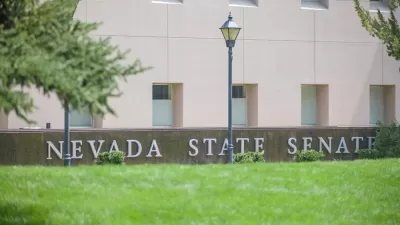Drought is reshaping western U.S. landscapes. Las Vegas banned ornamental grass in 2021. Aurora is now the first municipality in Colorado to curb the use of some grasses in new developments.

Aurora, Colorado is on the verge of banning certain varieties of grass—a move that is likely to become a trend in drought-stricken cities throughout the U.S. West.
Lindsey Toomer reports for the Denver Gazette that the Aurora City Council is one final vote away from restricting the use of “cool weather turf” (e.g., Kentucky bluegrass and fescue) for all development and redevelopment projects as well as for all new golf courses.
“A fact sheet for the ordinance says that Aurora gets less than 15 inches of precipitation every year. But cool weather turf requires as much as 28 inches of precipitation or irrigation in order to survive, and outdoor use accounts for half of the water used in Aurora every year,” explains Toomer.
More details on the ordinance, provided by Toomer:
The ordinance would primarily allow turf only in active or programmed recreation, such as sports fields, or other areas serving non-organized sports events, such as parks. Cool weather turf would be prohibited in medians, curbside landscape, residential front yards and limited in backyards to 500 square feet or 45% of the backyard, whichever is less. It also prohibits use of cool weather turf for new golf courses and bans ornamental water features, such as waterfalls, basins, ponds and exterior decorative fountains.
Aurora joins a small group of U.S. cities implementing drought restrictions in the landscapes of the built environment. Las Vegas, Nevada famously banned the use of Colorado River water for “nonfunctional turf” or “ornamental grass” in 2021. The entire Colorado River watershed is facing unprecedented drought conditions as a “megadrought” persists through the Southwest.
FULL STORY: Aurora gives unanimous initial approval to cool weather turf ban

Alabama: Trump Terminates Settlements for Black Communities Harmed By Raw Sewage
Trump deemed the landmark civil rights agreement “illegal DEI and environmental justice policy.”

Study: Maui’s Plan to Convert Vacation Rentals to Long-Term Housing Could Cause Nearly $1 Billion Economic Loss
The plan would reduce visitor accommodation by 25% resulting in 1,900 jobs lost.

Planetizen Federal Action Tracker
A weekly monitor of how Trump’s orders and actions are impacting planners and planning in America.

Waymo Gets Permission to Map SF’s Market Street
If allowed to operate on the traffic-restricted street, Waymo’s autonomous taxis would have a leg up over ride-hailing competitors — and counter the city’s efforts to grow bike and pedestrian on the thoroughfare.

Parklet Symposium Highlights the Success of Shared Spaces
Parklets got a boost during the Covid-19 pandemic, when the concept was translated to outdoor dining programs that offered restaurants a lifeline during the shutdown.

Federal Homelessness Agency Places Entire Staff on Leave
The U.S. Interagency Council on Homelessness is the only federal agency dedicated to preventing and ending homelessness.
Urban Design for Planners 1: Software Tools
This six-course series explores essential urban design concepts using open source software and equips planners with the tools they need to participate fully in the urban design process.
Planning for Universal Design
Learn the tools for implementing Universal Design in planning regulations.
Caltrans
Smith Gee Studio
Institute for Housing and Urban Development Studies (IHS)
City of Grandview
Harvard GSD Executive Education
Toledo-Lucas County Plan Commissions
Salt Lake City
NYU Wagner Graduate School of Public Service





























